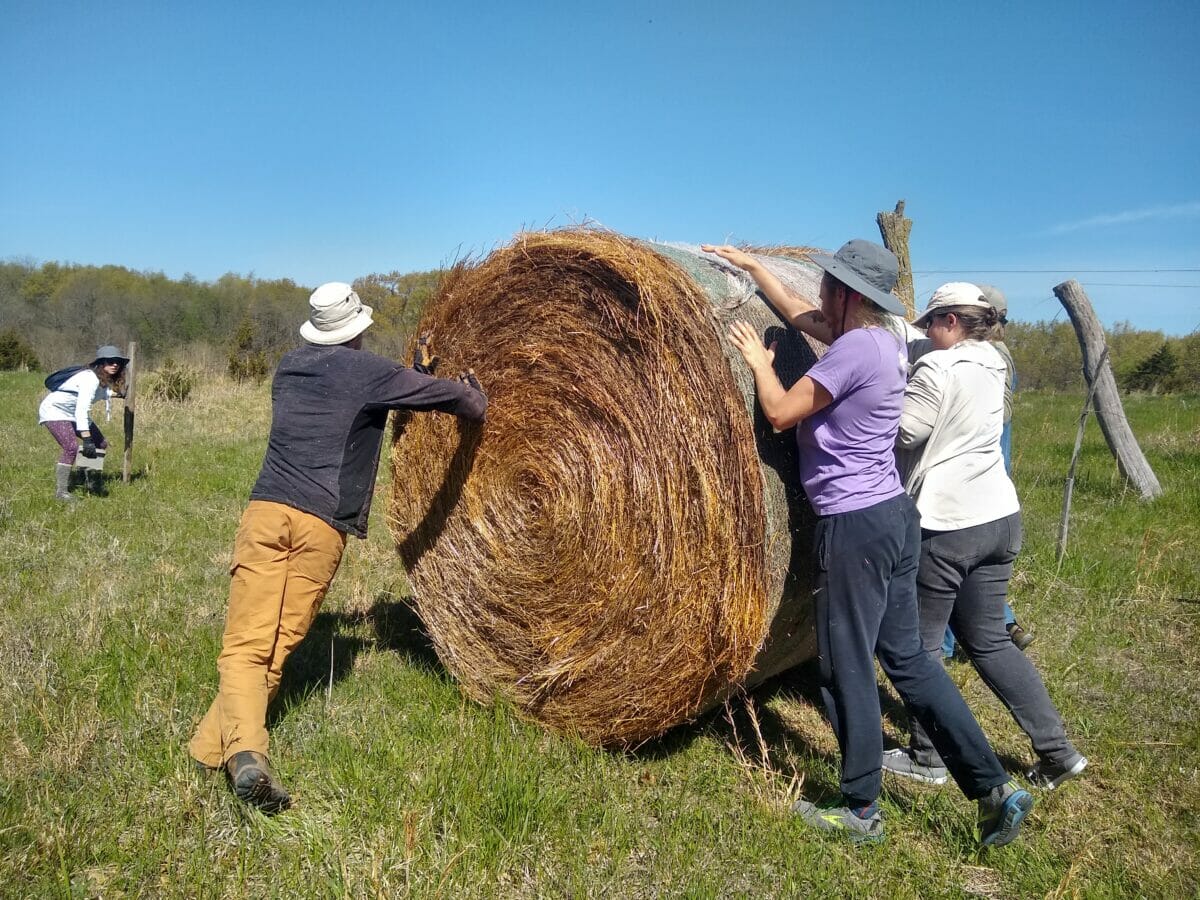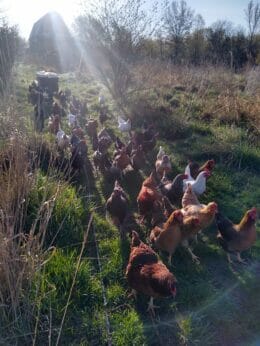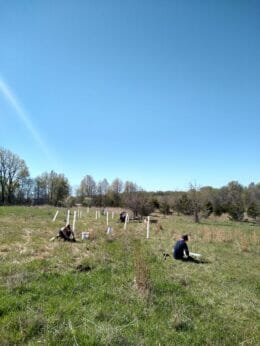Farming by Committee: How We Organize Our Agroforestry Co-op
While farming in a co-op can be more involved, it’s gratifying to share both the risks and the rewards.
Farming by Committee: How We Organize Our Agroforestry Co-op
While farming in a co-op can be more involved, it’s gratifying to share both the risks and the rewards.

A group of co-op members role bales of hay.courtesy of Benjamin Brownlow
We’re talking about the nuts again.
It seems to be a perpetual topic of conversation within my group of about 15 neighbors: where to place the nut orchard. Some want to see the orchard planted on the best soils, in a tidy block. Others feel strongly that we should re-establish native grasses on those verdant areas and that we can put the nut trees along marginal lands.
We go back and forth, back and forth for more than a year. For many farms, this would perhaps be a quick decision; the nuts are going here, now let’s be done with it. But this isn’t a typical farm. This is the Agroforestry Co-op of Northeast Missouri (AFCO). With more than a dozen members, we work to discuss issues fully, unclouded by our individual wants. If one member (an investor of material, financial or labor resources) decides a proposal is not taking into consideration a shared value, such as economic access or ecological rigor, we will discuss it until it is resolved. It takes some time, but, ultimately, it can lead to better decisions.

It wasn’t always my intention to farm in a group. But as a first-generation farmer and millennial, land access has been a challenge. When offered the opportunity to raise organic and pastured livestock by our community land trust, I accepted the responsibilities of stewardship of this clay-rich slope in Northeast Missouri. This hillside wears the scars of over-cultivation, overgrazing, compaction and erosion, with its west face battered by gullywasher storms and relentless, soil-shifting gales.
Agriculture has not always been such a lonely activity. From historical subsistence farming to the feudal practice of managing commons, and all the way up to modern examples of worker-owned co-operatives such as Humble Hands Harvest, Diggers’ Mirth Collective Farm and perpetual purpose trusts such as Perennial Promise Grower’s Coop, growing food has long been performed as an essentially co-operative endeavor. Still, I toiled alone for more than a decade, determined to tackle this undertaking myself.
This agrarian life often feels like a struggle for control with land, climate, pests and economies. It has led me to places of deep stubbornness, sometimes outright unwillingness to accept the help I need. That old stereotype of the tenacious, independent farmer has proven true—unfortunately, for my own well-being at times.

But the pandemic was the tipping point. I tried to navigate the perfect storm of supply chain bottlenecks, increased feed and fuel costs and the lack of access to approved meat processors for my grass-fed hogs. It became obvious then that I, or we rather, could better serve ourselves, our community and our relationship with land through collective farming.
I’ve always been drawn to tree crops and silvopasture, and I’ve experimented with small plantings on my pastures for years. On a whim, I applied to the University of Missouri’s Agroforestry Academy in 2022 and proposed an agroforestry co-op as my final project. When I returned from the academy, I hosted a meeting and invited my neighbors and friends. After putting out snacks and refreshments, a crucial part to any co-operative undertaking, I presented my idea to the group. Thus the seeds of the AFCO were sowed last June.
I now share the risk, labor and rewards of a life spent growing food and making dirt with about a dozen and a half neighbors, and I can move away from the physically exhausting and emotionally depleting work of raising, pasturing, killing and selling animals to a more collectivized and sustainable act of providing food and stewardship.
As a co-op, we have a few unique features that have worked well for us. We operate within a community land trust, a model that removes land from the speculative market and makes it available to like-minded ecosystem stewards and sustainability practitioners. We currently co-manage about 10 acres of land, and we’re integrating our agroforestry project throughout the rest of the land trust’s 280 acres. There are dozens of acres set aside for mushroom logs, timber stand improvement and habitat health. I also graze livestock through several pastures, which we are working to integrate with tree crops.
We have formed a relationship with a non-profit, The Center for Sustainable & Cooperative by Culture, in order to begin a grassroots fundraising campaign and connect with potential donors. We are all trained in nonviolent communication and shared decision-making, so that the tensions that sometimes arise when we have competing visions can be directed to helpful and healthy conversations. But the most important bit has been to share a common vision.
In our first year of work, AFCO has been a project both complex in its scope and fairly straightforward in its practice. Making good group decisions requires a common vision. We stand behind supporting local food sovereignty, restoring vulnerable ecosystems, creating land access and economic opportunities for underprivileged people and demonstrating alternatives to mainstream agriculture in our region. Any proposal for a project of the co-op is held up against these values. We are currently fairly informal in structure, so far as the IRS is concerned, and operate with full-member consensus decision-making instead of a board of directors.

This year is all about proof of concept. Can we pick out 100 trees we want, agree on where they belong and effectively put the right end in the ground? Yes. Can we engage in some prescribed woodland management and start a mushroom and biochar operation at community scale? Absolutely. How about pulling together the funds for planting a five-acre Chinese Chestnut orchard? Hopefully, because I have already put in the order for seedlings.
While there are “all hands on deck” field work days, we still engage in a division of labor. Folks who are less able to get out in the field can sit in a shaded area and assemble tree guards, or they can manage spreadsheets or work on grants or organize the logistical end-of-work parties. There is room for autonomy; while our larger proposals go through the process of consensus, individuals are empowered to make many day-to-day decisions, such as which cultivar of mushroom spawn to order or how to space and arrange plantings. We hope that AFCO can attract people with a dream to engage in agroforestry by offering land access, infrastructure, a budget and collectivized marketing and distribution of crops. We even hope to attract annual crop growers to plant between our contoured lanes of trees. It has been clear to each of us that AFCO exists to create future economic opportunities for folks we haven’t even met yet.
I understand going it alone. Co-operation is almost unnatural in our current culture, but that old stereotypical independent streak we sometimes take on as farmers is a bad bet in the face of such uncertain odds.
When we discuss a project, we agree to core principles on which to base our decisions and determine whether a proposal is justified within our broader goals. This is how we finally, after a year of working through it, managed to land on a parcel of land for our nut orchard that takes into account ecology and economy. It wasn’t a location that anybody felt excited about at first; yet, over time, it became apparent that the current plot achieves two goals satisfactorily instead of merely one goal perfectly. Much of farming seems to be about compromise; now we can get planting, together.
Follow us
This work is licensed under a Creative Commons Attribution-NoDerivatives 4.0 International License.
Want to republish a Modern Farmer story?
We are happy for Modern Farmer stories to be shared, and encourage you to republish our articles for your audience. When doing so, we ask that you follow these guidelines:
Please credit us and our writers
For the author byline, please use “Author Name, Modern Farmer.” At the top of our stories, if on the web, please include this text and link: “This story was originally published by Modern Farmer.”
Please make sure to include a link back to either our home page or the article URL.
At the bottom of the story, please include the following text:
“Modern Farmer is a nonprofit initiative dedicated to raising awareness and catalyzing action at the intersection of food, agriculture, and society. Read more at <link>Modern Farmer</link>.”
Use our widget
We’d like to be able to track our stories, so we ask that if you republish our content, you do so using our widget (located on the left hand side of the article). The HTML code has a built-in tracker that tells us the data and domain where the story was published, as well as view counts.
Check the image requirements
It’s your responsibility to confirm you're licensed to republish images in our articles. Some images, such as those from commercial providers, don't allow their images to be republished without permission or payment. Copyright terms are generally listed in the image caption and attribution. You are welcome to omit our images or substitute with your own. Charts and interactive graphics follow the same rules.
Don’t change too much. Or, ask us first.
Articles must be republished in their entirety. It’s okay to change references to time (“today” to “yesterday”) or location (“Iowa City, IA” to “here”). But please keep everything else the same.
If you feel strongly that a more material edit needs to be made, get in touch with us at [email protected]. We’re happy to discuss it with the original author, but we must have prior approval for changes before publication.
Special cases
Extracts. You may run the first few lines or paragraphs of the article and then say: “Read the full article at Modern Farmer” with a link back to the original article.
Quotes. You may quote authors provided you include a link back to the article URL.
Translations. These require writer approval. To inquire about translation of a Modern Farmer article, contact us at [email protected]
Signed consent / copyright release forms. These are not required, provided you are following these guidelines.
Print. Articles can be republished in print under these same rules, with the exception that you do not need to include the links.
Tag us
When sharing the story on social media, please tag us using the following: - Twitter (@ModFarm) - Facebook (@ModernFarmerMedia) - Instagram (@modfarm)
Use our content respectfully
Modern Farmer is a nonprofit and as such we share our content for free and in good faith in order to reach new audiences. Respectfully,
No selling ads against our stories. It’s okay to put our stories on pages with ads.
Don’t republish our material wholesale, or automatically; you need to select stories to be republished individually.
You have no rights to sell, license, syndicate, or otherwise represent yourself as the authorized owner of our material to any third parties. This means that you cannot actively publish or submit our work for syndication to third party platforms or apps like Apple News or Google News. We understand that publishers cannot fully control when certain third parties automatically summarize or crawl content from publishers’ own sites.
Keep in touch
We want to hear from you if you love Modern Farmer content, have a collaboration idea, or anything else to share. As a nonprofit outlet, we work in service of our community and are always open to comments, feedback, and ideas. Contact us at [email protected].by Benjamin Brownlow, Modern Farmer
June 26, 2023
Modern Farmer Weekly
Solutions Hub
Innovations, ideas and inspiration. Actionable solutions for a resilient food system.
ExploreExplore other topics
Share With Us
We want to hear from Modern Farmer readers who have thoughtful commentary, actionable solutions, or helpful ideas to share.
SubmitNecessary cookies are absolutely essential for the website to function properly. This category only includes cookies that ensures basic functionalities and security features of the website. These cookies do not store any personal information.
Any cookies that may not be particularly necessary for the website to function and are used specifically to collect user personal data via analytics, ads, other embedded contents are termed as non-necessary cookies.
Ben, you are a tented writer because you are a great story teller. Thank you.
I loved reading your article! I am a worker-owner of Salt Creek Farmers’ Cooperative just outside of Lincoln Nebraska. We would love to collaborate sometime!
*Oops! Talented not tented.
First, people cooperate all the time in our culture. Otherwise, much wouldn’t get done. Co-ops are nice as long as internal politics doesn’t raise its’ head.